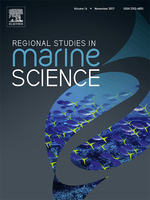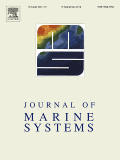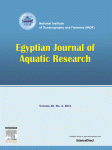
Marine Pollution Bulletin
Scope & Guideline
Illuminating the path to sustainable marine environments.
Introduction
Aims and Scopes
- Marine Pollution Assessment:
The journal emphasizes the assessment of various pollutants, including heavy metals, microplastics, and persistent organic pollutants (POPs), in marine ecosystems. Studies often involve quantitative analysis and ecological risk assessments. - Ecotoxicology and Health Risk:
Research highlights the ecotoxicological effects of pollutants on marine organisms and the subsequent implications for human health, particularly through seafood consumption. - Bioremediation and Environmental Recovery:
The journal publishes studies on bioremediation strategies for polluted marine environments, including the use of microbial communities and natural processes to mitigate pollution effects. - Climate Change Impacts:
There is a consistent focus on understanding how climate change affects marine pollution dynamics, including temperature and acidification impacts on pollutant behavior and marine life. - Innovative Monitoring Techniques:
Research includes the development and application of novel monitoring techniques, such as remote sensing, machine learning, and molecular biology methods, to assess and track marine pollution. - Community and Policy Engagement:
The journal also explores community-based approaches and policy implications for improving marine pollution management and enhancing public awareness.
Trending and Emerging
- Microplastic Pollution:
Research on microplastics is rapidly increasing, focusing on their occurrence, distribution, and ecological impacts across various marine environments. This trend highlights the urgent need to understand microplastic dynamics and their implications for marine life. - Emerging Contaminants:
There is a growing emphasis on emerging contaminants, such as pharmaceuticals, personal care products, and new chemical compounds, and their ecological risks, indicating a shift towards understanding modern pollution sources. - Integrated Management Approaches:
The journal is increasingly publishing studies that advocate for integrated management strategies for marine pollution, combining scientific research with policy-making to address complex environmental issues. - Community Engagement and Citizen Science:
There is a rising trend in research involving community engagement and citizen science initiatives to monitor and manage marine pollution, demonstrating a shift towards collaborative approaches in environmental stewardship. - Climate Change and Pollution Interactions:
Recent studies are increasingly examining the interactions between climate change factors, such as ocean acidification and warming, and their effects on marine pollution dynamics, reflecting an emerging interdisciplinary focus.
Declining or Waning
- Traditional Chemical Pollution Studies:
There is a noticeable decline in publications focusing solely on traditional chemical pollution without the integration of newer contaminants such as microplastics and pharmaceuticals. - Longitudinal Studies:
Fewer longitudinal studies examining the long-term effects of marine pollution on ecosystems are being published, as the journal shifts towards more immediate and actionable research. - Laboratory-Based Toxicity Testing:
Research focusing exclusively on laboratory-based toxicity testing without field validation or ecological relevance is becoming less common, with more emphasis on real-world applications and assessments.
Similar Journals

Regional Studies in Marine Science
Pioneering Insights into Oceanic InteractionsRegional Studies in Marine Science, published by Elsevier, is a leading academic journal dedicated to advancing the understanding of marine ecosystems and their regional dynamics since its inception in 2015. With an ISSN of 2352-4855, this journal is indexed in Scopus and has achieved impressive ranking quartiles, notably Q2 in categories like Animal Science and Zoology, and Ecology, showcasing its relevance and impact in these fields. As of 2023, it ranks in the 79th percentile for Animal Science and Zoology, reflecting its significant contribution to academic discourse. While the journal operates under a traditional access model, its rigorous peer-review process ensures the publication of high-quality research that is crucial for understanding ecological interactions and fostering sustainable practices within marine environments. Researchers, professionals, and students alike will find this journal an invaluable resource for the latest findings and advancements in marine science, as it strives to bridge the gap between research and practical application at regional and global levels.

Russian Journal of Marine Biology
Diving into the Wonders of OceanographyRussian Journal of Marine Biology, published by MAIK NAUKA/INTERPERIODICA/SPRINGER, serves as a vital platform for disseminating research in the fields of Aquatic Science and Oceanography. With an ISSN of 1063-0740 and E-ISSN 1608-3377, this journal has been in circulation since 1996 and continues to contribute valuable insights across its specified domains. Although it currently holds a Q4 quartile ranking in both fields as of 2023, the journal's impact is underscored by its focused niche in marine biology, attracting contributions from a diverse global research community. Researchers and professionals will find its articles essential for advancing their knowledge and understanding of marine ecosystems and biological processes. While not currently an open access journal, the Russian Journal of Marine Biology remains committed to enhancing the scientific discourse aimed at fostering sustainable marine environments.

JOURNAL OF OCEANOGRAPHY
Unveiling the Secrets Beneath the WavesJOURNAL OF OCEANOGRAPHY, published by Springer, stands as a leading academic journal in the field, with an impressive Q1 ranking in Oceanography for 2023. Since its inception in 1992, this journal has dedicated itself to the dissemination of high-quality research that spans a diverse array of topics within oceanography and earth sciences. With an ISSN of 0916-8370 and an E-ISSN of 1573-868X, it plays a crucial role in bridging the gap between academia and practical marine applications. The journal is indexed in Scopus, ranking #57 out of 145 in its category, reflecting its rigorous academic standards and the impact of its published works, reaching a notable ile in the 61st percentile. Located in Japan, the JOURNAL OF OCEANOGRAPHY provides a vital platform for sharing significant research findings that contribute to our understanding of marine environments, aiming to foster interdisciplinary collaboration among researchers, professionals, and students dedicated to marine science.

Journal of Oceanology and Limnology
Bridging Disciplines for a Healthier PlanetJournal of Oceanology and Limnology, published by SCIENCE PRESS, is a premier academic journal dedicated to advancing the fields of oceanography and limnology. With an ISSN of 2096-5508 and E-ISSN 2523-3521, this journal has emerged as a vital resource since its inception, aiming to disseminate cutting-edge research and comprehensive studies on aquatic environments. Based in China and indexed with notable rankings in Scopus, including a Q2 category in Oceanography and a Q3 category in Water Science and Technology, this journal significantly contributes to knowledge in these crucial scientific disciplines. The H-index for the journal is currently being established, reflecting its evolving impact within the academic community. Moreover, the open access model promotes wider dissemination, ensuring that research findings are accessible to a global audience. Covering a diverse range of topics from ecosystem health to climate impact on water bodies, the Journal of Oceanology and Limnology aspires to foster interdisciplinary dialogue and innovation among researchers, professionals, and students engaged in understanding and preserving aquatic life.

VIE ET MILIEU-LIFE AND ENVIRONMENT
Exploring the Depths of Ecology and Aquatic ScienceVIE ET MILIEU - LIFE AND ENVIRONMENT is a pivotal journal in the realms of aquatic science and ecology, serving as a vital platform for researchers and professionals interested in the interconnections between living organisms and their environments. Published by the esteemed OBSERVATOIRE OCEANOLOGIQUE BANYULS in France, this journal has been disseminating valuable research since its inception in 1980, with volumes covering various topics pertinent to environmental dynamics through to 2024. Despite its current classification in the Q4 quartile for both aquatic science and ecology, the journal offers a unique opportunity for scholars to contribute to niche areas often overlooked by more prominent publications. VIE ET MILIEU is committed to fostering a comprehensive understanding of ecological interactions and the conservation of aquatic ecosystems, making it an essential resource for those engaged in environmental science and biology. Researchers can access a wealth of knowledge that supports their work, encourages collaboration, and inspires innovative approaches to pressing ecological issues.

JOURNAL OF MARINE SYSTEMS
Unveiling the Complexities of Our OceansJOURNAL OF MARINE SYSTEMS, published by Elsevier, is a leading academic journal dedicated to advancing the understanding of marine systems through interdisciplinary research. With an impressive impact factor and ranking in the Q1 quartile across various categories such as Aquatic Science, Ecology, and Oceanography, this journal has established itself as an invaluable resource for researchers, professionals, and students interested in marine science and its applications. Since its inception in 1990, the journal has been a platform for high-quality studies, offering insights into complex marine ecosystems, their dynamics, and their interactions with human activities. Notably, it is indexed in major databases, which ensures visibility and accessibility for global audiences. Researchers are encouraged to share their findings and contribute to the ongoing dialogue about the health and sustainability of marine environments.

Oceans-Switzerland
Diving into the Science of Our OceansOceans-Switzerland, published by MDPI, is an esteemed open-access journal established in 2020, with a focus on providing a platform for the dissemination of high-quality research in the fields of Environmental Science and Oceanography. Based in the picturesque city of Basel, Switzerland, the journal seeks to foster a deeper understanding of oceanic processes and their implications for the environment through rigorous peer-reviewed articles. With an impact factor reflected in its 2023 Scopus rankings, placing it in the 56th percentile across its categories, Oceans-Switzerland continues to promote interdisciplinary collaboration and innovation, targeting a wide audience of researchers, professionals, and students keen on exploring the complexities of ocean systems. The journal's commitment to open-access policy ensures that groundbreaking research is available to a global audience, reinforcing its crucial role in advancing knowledge and shaping practices within the scientific community.

OCEANOLOGY
Diving into Innovative Marine ResearchOCEANOLOGY is a distinguished journal published by Pleiades Publishing Inc that has been a pivotal platform for advancing knowledge in the field of oceanography since its inception. With an ISSN of 0001-4370 and E-ISSN 1531-8508, this journal covers a range of topics related to marine sciences, geographical oceanography, and environmental studies, providing insights and research that significantly contribute to our understanding of oceanic systems. Recognized for its academic rigor, OCEANOLOGY holds a Q3 quartile ranking in the Oceanography category as of 2023, reflecting its impact within the scientific community as evidenced by its Scopus rank of 85 out of 145. Although currently not an open-access journal, OCEANOLOGY remains essential for researchers, professionals, and students by offering a comprehensive collection of peer-reviewed articles. This multidisciplinary approach equips its audience with valuable data and perspectives critical for ongoing research and development in ocean-related fields.

ENVIRONMENTAL SCIENCE AND POLLUTION RESEARCH
Exploring Solutions for a Sustainable FutureEnvironmental Science and Pollution Research is a premier international journal published by Springer Heidelberg, dedicated to advancing knowledge in the field of environmental science and pollution. With an impressive impact factor reflecting its vital contributions to research, the journal is categorized in the top quartiles (Q1 and Q2) across several domains, including Health, Toxicology and Mutagenesis, and Environmental Chemistry. Established in 1994, it continues to be a critical resource for researchers, professionals, and students focusing on pressing environmental issues. The journal provides an insightful platform for disseminating significant findings related to pollution and its effects on health and the environment, contributing to a better understanding and resolution of these challenges. While it currently does not offer Open Access options, its inclusion in prominent rankings, such as the Scopus rankings, underscores its reputation and influence within the scientific community.

Egyptian Journal of Aquatic Research
Advancing aquatic science for a sustainable future.Welcome to the Egyptian Journal of Aquatic Research, a premier peer-reviewed academic journal published by ELSEVIER, dedicated to advancing the field of aquatic sciences. With a robust impact factor and recognition as a Q1 journal in key categories such as Aquatic Science and Ecology, this open access journal has established itself as a vital platform for disseminating high-quality research since its inception in 2012. The journal aims to provide comprehensive coverage of topics including ecology, evolutionary biology, and water science, making it a crucial resource for researchers, professionals, and students engaged in these dynamic fields. With Scopus rankings placing it in the top echelons of various categories, the Egyptian Journal of Aquatic Research fosters innovation, collaboration, and knowledge dissemination on a global scale, making it an indispensable asset for anyone invested in understanding and preserving aquatic systems.